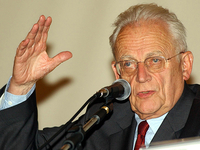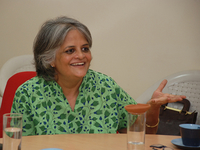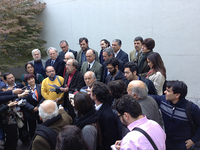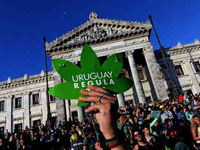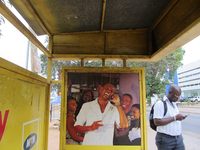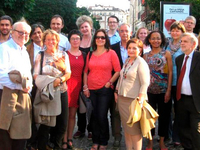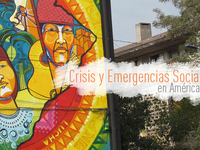GD 4.1 - March 2014
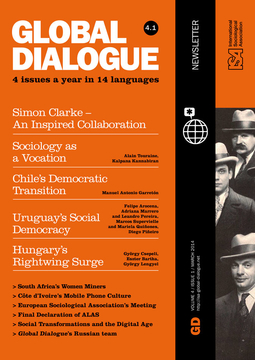
Global Dialogue is available in multiple languages!
Select the language to download the issue.
Editors:
Michael Burawoy.
Associate Editor:
Margaret Abraham, Tina Uys, Raquel Sosa, Jennifer Platt, Robert Van Krieken.
Managing Editors:
Lola Busuttil, August Bagà.
Consultants:
Abigail Andrews.
Media Consultant:
Gustavo Taniguti, José Reguera.
Consulting Editors:
Izabela Barlinska, Louis Chauvel, Dilek Cindoğlu, Tom Dwyer, Jan Fritz, Sari Hanafi , Jaime Jiménez, Habibul Khondker, Simon Mapadimeng, Ishwar Modi, Nikita Pokrovsky, Emma Porio, Yoshimichi Sato, Vineeta Sinha, Benjamín Tejerina, Chin-Chun Yi, Elena Zdravomyslova.
REGIONAL EDITORS
Arab World: Sari Hanafi , Mounir Saidani.
Brazil: Gustavo Taniguti, Juliana Tonche, Andreza Galli, Renata Barreto Preturlan, Ângelo Martins Júnior, Lucas Amaral, Celia Arribas, Rafael de Souza.
Colombia: María José Álvarez Rivadulla, Sebastián Villamizar Santamaría, Andrés Castro Araújo, Katherine Gaitán Santamaría.
India: Ishwar Modi, Rajiv Gupta, Rashmi Jain, Jyoti Sidana, Ritu Saraswat, Uday Singh.
Iran: Reyhaneh Javadi, Hamidreza Rafatnejad, Saghar Bozorgi, Najmeh Taheri.
Japan: Kazuhisa Nishihara, Mari Shiba, Kousuke Himeno, Tomohiro Takami, Yutaka Iwadate, Kazuhiro Ikeda, Yu Fukuda, Michiko Sambe, Yuko Hotta, Yusuke Kosaka, Shuhei Naka, Kiwako Kase, Misa Omori, Kazuhiro Kezuka.
Poland: Krzysztof Gubański, Kinga Jakieła, Kamil Lipiński, Przemysław Marcowki, Karolina Mikołajewska, Mikołaj Mierzejewski, Adam Müller, Karolina Fiut, Patrycja Pendrakowska, Nastazja Stoch, Teresa Teleżyńska.
Romania: Cosima Rughiniș, Ileana-Cinziana Surdu, Adriana Bondor, Ramona Cantaragiu, Miriam Cihodariu, Daniela Gaba, Angelica Helena Marinescu, Cătălina Petre, Mădălin Rapan, Lucian Rotariu, Alina Stan, Balazs Telegdy, Elena Tudor, Cristian Constantin Vereș. Russia: Elena Zdravomyslova, Anna Kadnikova, Elena Nikiforova, Asja Voronkova.
Taiwan: Jing-Mao Ho.
Turkey: Aytül Kasapoğlu, Nilay Çabuk Kaya, Günnur Ertong, Yonca Odabaş, Zeynep Baykal, Gizem Güner.
GD 4.1 - March 2014
Editorial
Reactions to Neoliberalism
We live in a neoliberal world where markets spread ever wider and ever deeper. Nothing escapes the market as it enters terrains that have for long been protected. From being a creative activity labor becomes the source of ever more uncertain survival; from being a medium of exchange money becomes a vehicle for making more money through loans and bets on loans, leading to wealthy creditors at one pole and impoverished debtors at the other; from sustaining life, nature (land water, air) is subject to the destructive forces of capitalism, and turned into a high-priced commodity, encouraging violent dispossession; once a public good, knowledge is now sold to the highest bidder whether they be students in search of credentials or corporations in search of subsidized research. The commodification of each factor of production feeds the commodification of all. There seems to be no limit to the market.
Yet markets generate their counter-tendencies whether these be social movements and/or state regulation. This issue contains four articles on Uruguay’s socialist response to the dilemmas of global marketization: redistributive policies leading to and caused by strong unions; social policies that have legalized abortion, same-sex marriage, and marijuana; the retention of high levels of public education. Capitalism, on the other hand, has invaded agriculture, transforming agrarian society into a vehicle of accumulation. In power for the second term, the broad socialist front that includes former members of the Tupamaros guerrilla movement, pursued a popular mandate for social democracy, a trajectory so different from Chile’s conservative road. Despite the rise of pink or electoral socialism in Argentina, Brazil, Ecuador, Venezuela, and Bolivia, Uruguay’s social democracy stands out as both humane and successful.
If Uruguay is an outlier in Latin America, then Hungary is an outlier within the former Soviet bloc – not in its socialism but in its authoritarian populism, an alternative response to the destructive powers of the market. The three articles from Hungary describe the rise of a mafia state headed by the self-aggrandizing Viktor Orbán, so different from Uruguay’s President José Mujica who lives the humblest of lives. In Hungary political elites ever more removed and ever more ruthless close down democracy and public debate, discredit the idea of class as a communist distortion even as class becomes ever more salient, and cultivate a national chauvinism aimed against Jews and Roma people while scapegoating the European Union for Hungary’s economic plight.
Two countries with very different economic and political histories respond to the same neoliberal stimulus with divergent political strategies. But can either social democracy or populist authoritarianism reverse the momentum of marketization that stalks the planet almost unhindered? Does the reversal of neoliberalism require a counter-movement not just on a national level but on a global scale, and what might that look like? Would such a global counter-movement expand or contract freedoms? Is it feasible or are we heading ineluctably for collective self-destruction?
Michael Burawoy, editor of Global Dialogue
Global Dialogue can be found in multiple languages.
Submissions should be sent to globaldialogue@isa-sociology.org.


